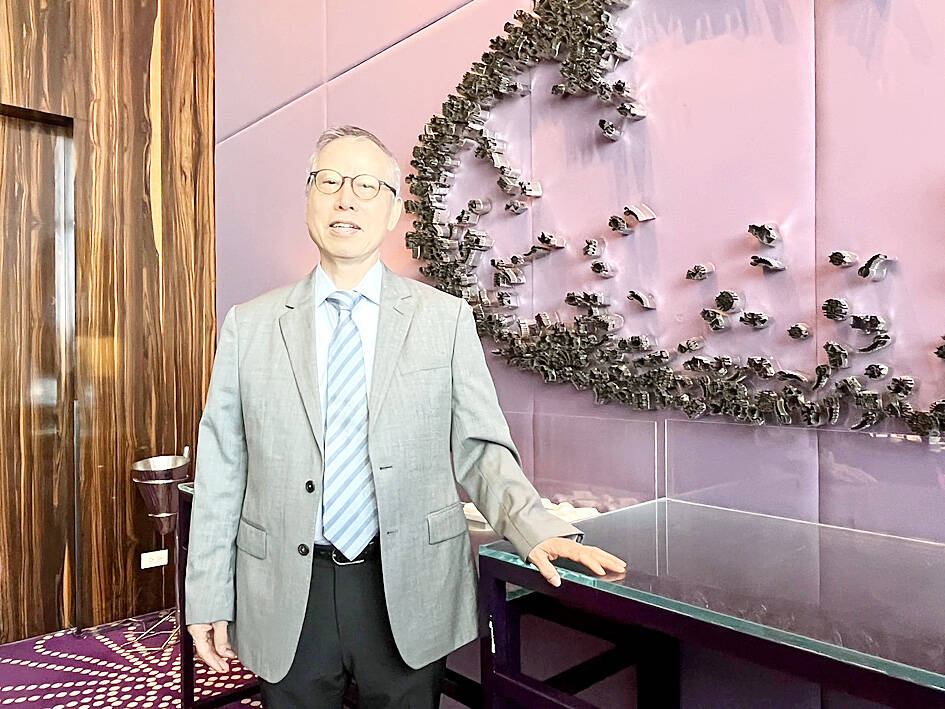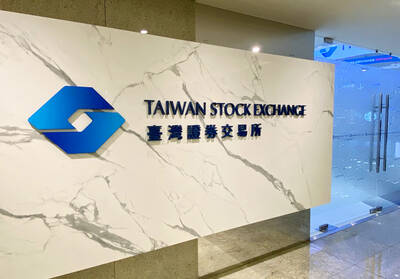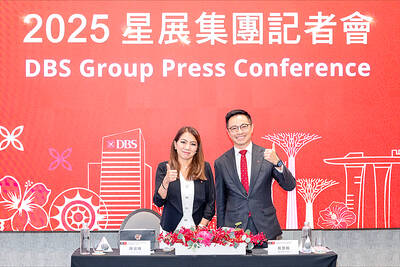Solar cell and module manufacturers are experiencing low factory utilization in the wake of energy-related political scandals, United Renewable Energy Co (URE, 聯合再生) said yesterday, adding that companies would only meet half of the government’s targeted solar power installations this year.
The Hsinchu-based company’s remarks came after some local government officials were caught up in scandals linked to green energy installations, and following the suspension of a number of solar projects amid bribery investigations.
Some local governments have reportedly shelved solar energy programs due to concern over allegedly toxic solar panels and potential pollution.

Photo: Chang Hui-wen, Taipei Times
The Taiwan Photovoltaic Industry Association last week said that those claims were groundless and untrue.
In the wake of those allegations ahead of the upcoming presidential and legislative elections next year, companies would only be able to install less than 1 gigawatt of solar panels this year, half of the government’s annual installation target of 2 gigawatts, URE chairman Sam Hong (洪傳獻) said.
Hong said that the solar supply chain — from solar cell manufacturers, solar contractors that primarily perform engineering, procurement and construction work to solar farm developers — faces severe challenges ahead of the elections.
“This year is a bad year for all of us. It will be a challenge for URE and our peers to keep factory utilization at 50 percent,” he said. “Local governments put new development projects on hold. Besides, some projects that are ready to start have been postponed because of political factors.”
There is a slim chance to turn around production this year, given the tough environment for the industry, he said.
The company posted a NT$363 million (US$11.25 million) loss during the first half of this year, but Hong said he has high hopes for next year.
“Demand should come back after the elections,” he said, adding that the government should then accelerate solar projects to achieve its green energy goals.
The new-generation solar cell, called tunnel oxide passivated contact (TOPCon), is expected to become a mainstream product, as it delivers better efficiency than passivated emitter and rear contact solar cell technology, Hong said.
The upgrade also offers better profit margins for cell makers, he added.
URE plans to ramp up its first TOPCon production line in the first half of next year, with an installed capacity of 400 megawatts in the initial stage, he said.
URE plans to showcase its latest products during the annual Energy Taiwan and Net-Zero Taiwan trade shows that begin tomorrow at Taipei Nangang Exhibition Center’s Hall 1.
The twin events are expected to attract 350 participants this year, including Motech Industries Inc (茂迪) and TSEC Corp (元晶太陽能), up 28 percent from the previous year, co-organizer the Taiwan External Trade Development Council (外貿協會) said.

Taiwan Semiconductor Manufacturing Co (TSMC, 台積電) secured a record 70.2 percent share of the global foundry business in the second quarter, up from 67.6 percent the previous quarter, and continued widening its lead over second-placed Samsung Electronics Co, TrendForce Corp (集邦科技) said on Monday. TSMC posted US$30.24 billion in sales in the April-to-June period, up 18.5 percent from the previous quarter, driven by major smartphone customers entering their ramp-up cycle and robust demand for artificial intelligence chips, laptops and PCs, which boosted wafer shipments and average selling prices, TrendForce said in a report. Samsung’s sales also grew in the second quarter, up

LIMITED IMPACT: Investor confidence was likely sustained by its relatively small exposure to the Chinese market, as only less advanced chips are made in Nanjing Taiwan Semiconductor Manufacturing Co (TSMC, 台積電) saw its stock price close steady yesterday in a sign that the loss of the validated end user (VEU) status for its Nanjing, China, fab should have a mild impact on the world’s biggest contract chipmaker financially and technologically. Media reports about the waiver loss sent TSMC down 1.29 percent during the early trading session yesterday, but the stock soon regained strength and ended at NT$1,160, unchanged from Tuesday. Investors’ confidence in TSMC was likely built on its relatively small exposure to the Chinese market, as Chinese customers contributed about 9 percent to TSMC’s revenue last

Taiwan and Japan will kick off a series of cross border listings of exchange-traded funds (ETFs) this month, a milestone for the internationalization of the local ETF market, the Taiwan Stock Exchange (TWSE) said Wednesday. In a statement, the TWSE said the cross border ETF listings between Taiwan and Japan are expected to boost the local capital market’s visibility internationally and serve as a key for Taiwan becoming an asset management hub in the region. An ETF, a pooled investment security that is traded like an individual stock, can be tracked from the price of a single stock to a large and

Despite global geopolitical uncertainties and macroeconomic volatility, DBS Bank Taiwan (星展台灣) yesterday reported that its first-half revenue rose 10 percent year-on-year to a record NT$16.5 billion (US$537.8 million), while net profit surged 65 percent to an unprecedented NT$4.4 billion. The nation’s largest foreign bank made the announcement on the second anniversary of its integration with Citibank Taiwan Ltd’s (花旗台灣) consumer banking business. “Taiwan is a key market for DBS. Over the years, we have consistently demonstrated our commitment to deepening our presence in Taiwan, not only via continued investment to support franchise growth, but also through a series of bolt-on acquisitions,” DBS